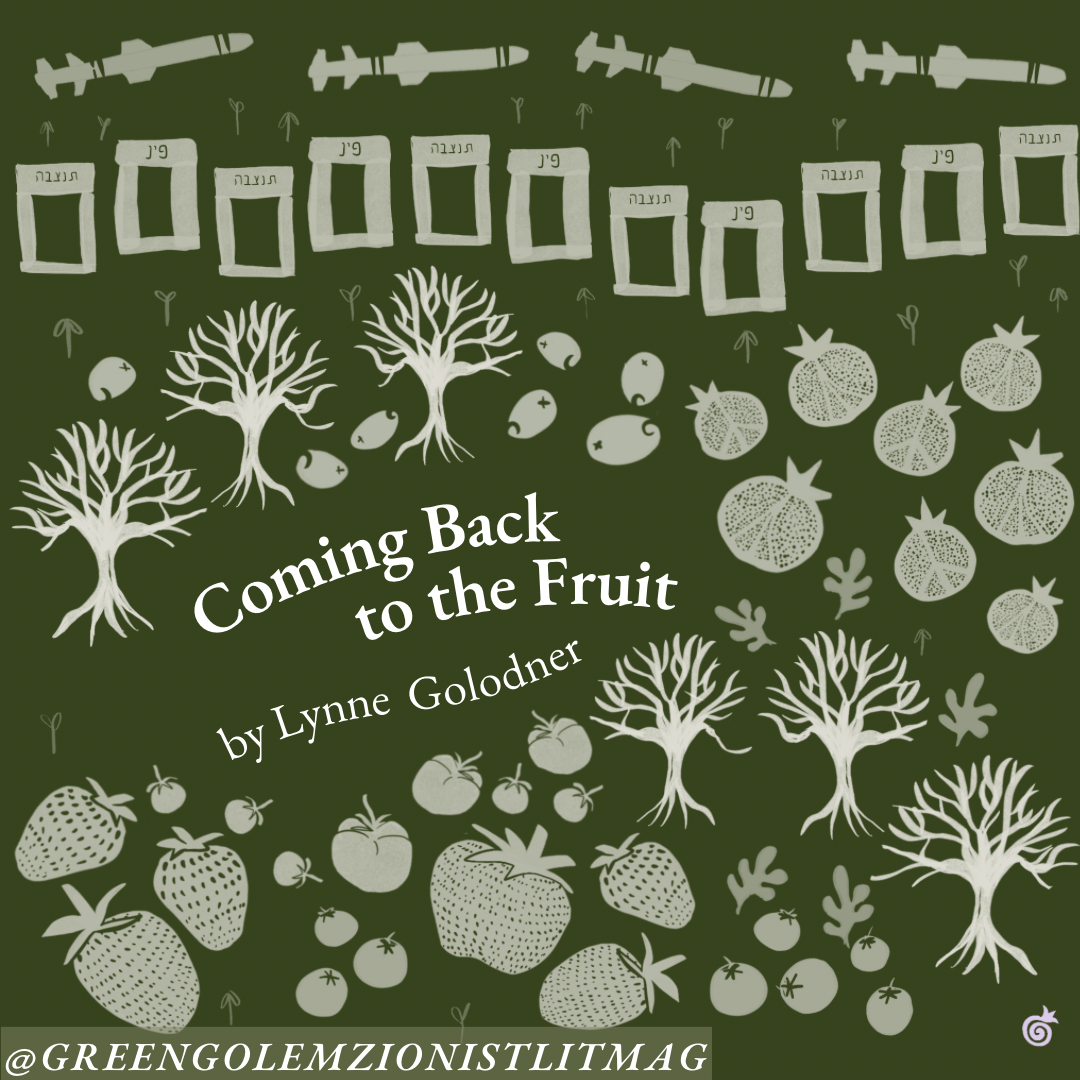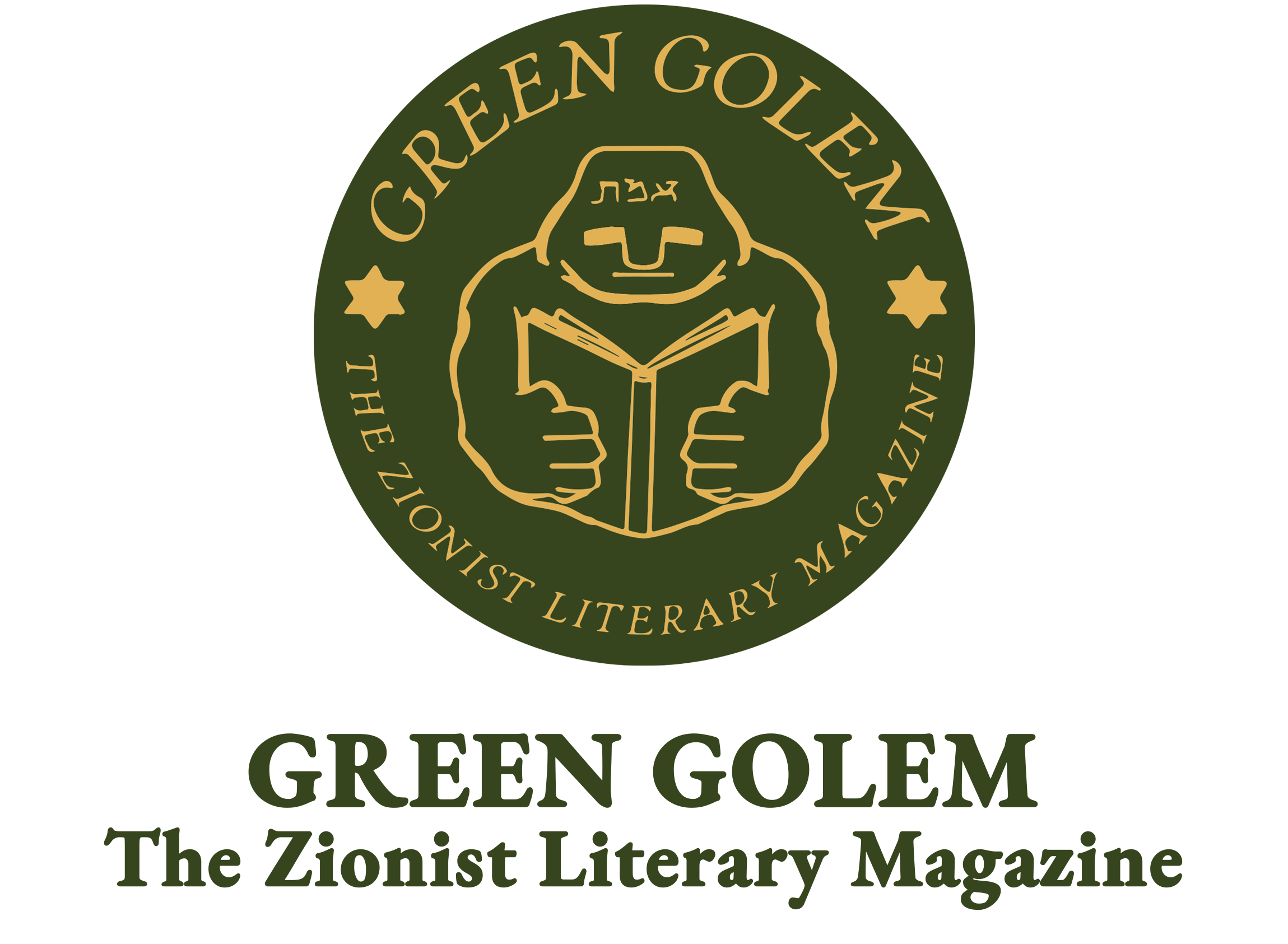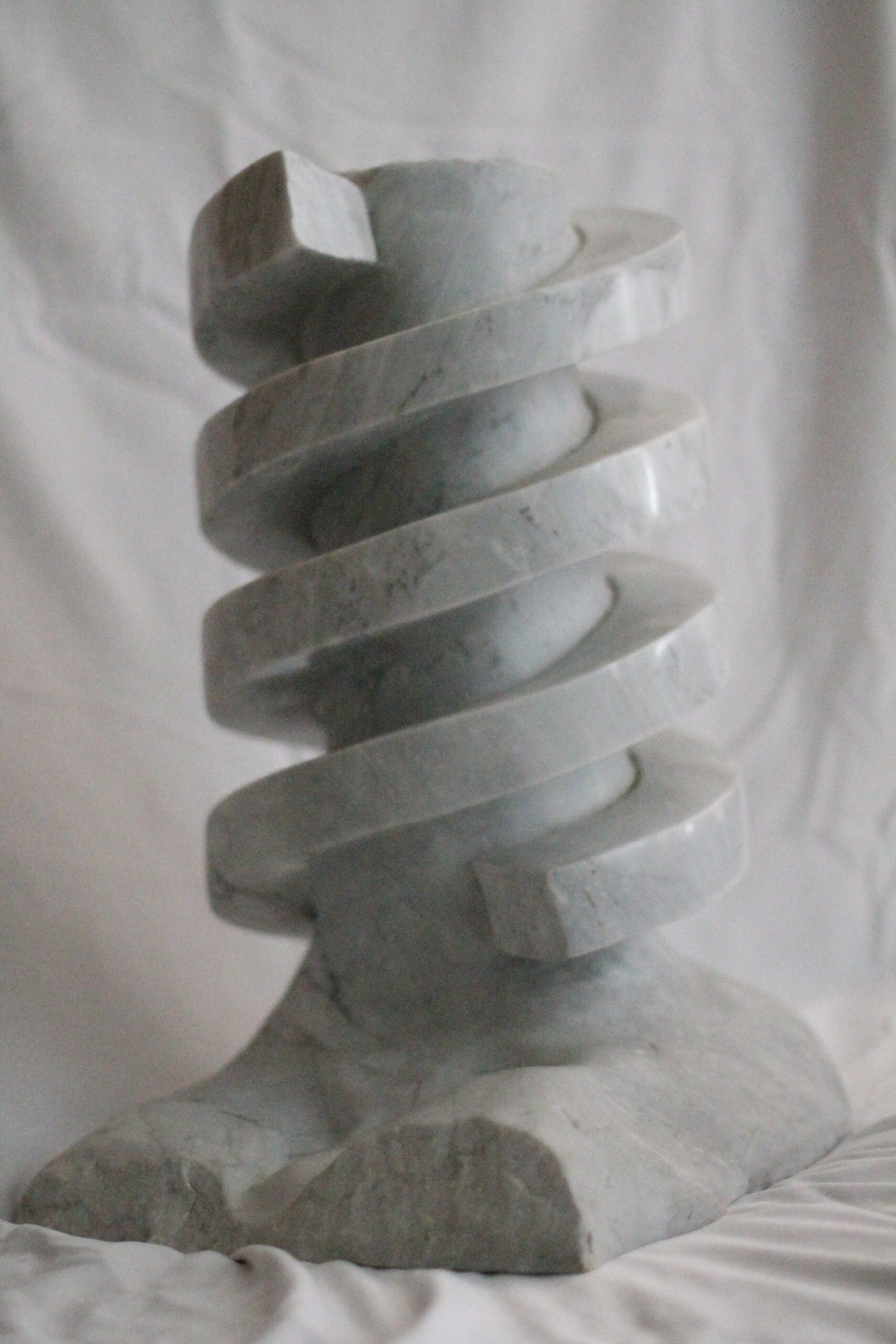Coming Back to the Fruit

Lynne Golodner is the Detroit-based author of nine books, a…
In June, I pick strawberries, crouching close to the ground, ankles burning as I pull soft berries from the vines. The reddest ones stain my fingers. The sun is hot on the open field. In Michigan, the strawberries are ripe for just three weeks. My youngest son was born in the end of May, and I didn’t want to miss the crop that year. He was small and new and slept against my body in a cloth sling, and sweat streamed down my cheeks as I squatted to pick the berries. It was hard—the kind of hard that you do because there is no other choice—and my older children, toddlers both, ran along the rows, palming berries and painting their faces as they ate them.
In July, it’s blueberries. When my children were little, they ran up and down the rows, their little fat hands gripping the metal handles of plastic buckets. Eliana in golden wisps of pigtails, Asher with a head of curls, Shaya in my arms until he could scramble after them. The bushes were taller than all of us, the berries dusted gray in the slow of summer. We popped berries into our mouths like candy.
August and September, Michigan fields are full with apples. When I was a child, I climbed ladders to reach the highest branches. No one worried about liability then, and safety was relative. There’s a picture of me and my sister and brother in the orchard, all smiling. Every year, I take my children to the apple orchards, the scent of fall on the wind and a late autumn sun burning our skin. Even now, the kids are grown but still they come with me because there is something freeing about being in the orchards. The lack of noise, perhaps, or the rush of wind, or the sweet-tart scent of too-ripe apples hitting the ground and fermenting in the late-day sun. When I think of the fall, I hear the buzz of bees and taste a fat drop of honey. Everything comes ripe in this part of the world then, the colors at their height before everything goes gray for the long and tedious winter.
In the aftermath of the Hamas massacre on October 7, 2023, Israeli fields laid fallow. Farmers were called up to serve in the rescue and retaliation just when strawberries were ripening, and day laborers weren’t allowed in. Some of my friends flew there to help pick. Things that grow always need harvesting, even in a time of war. I wanted to go. Desperately. But something always got in the way.
I know the seasons of the year by the crops ready for picking. And then, I feel close to the earth, nourished by the work of my hands. I was raised to believe that Jews were professionals—lawyers, doctors, accountants—not farmers, but the only Jewish nation, Israel, is an agricultural wonder. The Israeli agriculture market generates some $6.92 billion annually, and is estimated to grow by nearly 5 percent each year. Israel exports an incredible amount of fresh produce and is a global leader in agricultural technology. With more than half of its acreage not suitable for farming, and water in scarce supply, it’s a wonder that Jewish pioneers could turn dry and dusty cracked earth into fertile fields. In my American landscape, I wait for the final frost to plant a garden and as the season erupts with huge vegetables desperate for picking, I go to the orchards to pull fruit with my bare hands, a rebellion against my upbringing.
On Tu b’Shevat, the Jewish new year of the trees, we go to synagogue and eat produce from Israel. Usually it’s January or February, and my husband asks why we do this in stark North American winter. Because Jews celebrate our connection to the land, I say—a particular and historical land of our long-lived people. We eat dates and olives and pomegranate seeds from the land that holds our heritage, ancestry and memory. The rabbi talks about the symbolism of these fruits—those with a hard outer shell and sweet interior, those which can be eaten whole, those that are edible on the outside but not inside, and then the spiritual symbolism of a mystical fourth fruit that invites contemplation of how land connects to heritage. We sing “Hatikvah,” the Israeli national anthem, which means the hope. I know the meaning of some of the Hebrew words, especially the ones that refer to the land.
Growing up, we never had a garden. My parents weren’t the kind of people who put their hands in the dirt. For a long time, I wanted to know the names of plants. When I bought a home of my own, I planted a garden as a form of rebellion. And also, a coming-home. Each year, I dig up more of the grass and expanded the fencing so I can plant vegetables. I bury seeds in soft, spongy soil; I water, rake, and weed. Tomatoes and cucumbers and leafy greens and zucchinis grow all summer long and into the fall, until the first real frost, and then I carry arms-full of produce flecked with dirt from my little spot of cultivated earth into my secure house. Sometimes I pop a sun-warmed tomato onto my tongue and stab it with my teeth just to feel the spray of juice and seeds in my mouth, sweet and tangy and hot just off the vine.
I don’t need a safe room in this part of the world, though we lock our doors and set an alarm for an illusion of protection. Nothing grows here in the winter, but in Israel, the growing season is all year long. Since the war broke out, I’ve checked flight times and costs. I want to go to pick fruit for the people who aren’t there to do it. If fields are abandoned, the economy falters, and the only Jewish state in the world starts to crumble. I can’t have that.
But I had a trip in January and another in February and another in March and there is only so much money. I want to go, but I don’t go. I wish I were there. I feel guilty that I’m not. Privileged. So many times I’ve said I want to go, I want to help, but I can’t or I won’t or maybe later.
I live in the in-between. So Jewish, and so American, living here, while my heart is there. My first time in Israel, just after the assassination of Yitzhak Rabin, something in the air, the soil, made me weep. And the storefronts and restaurants with mezuzahs on their doors—a boutique, a corner grocery, emblazoned with the symbol of a Jewish home. It was the first place I felt I belonged, fully. Everywhere, there were Jews. Beautiful, strong, outspoken and strident. These were my people, finally. Not the shadows of Jews with pale sunken cheeks and striped pajamas. Not bearded brethren hiding behind musty books. Not American immigrants changing their names to better fit in.
When I was young and single and living in a small post-war bungalow alone, I woke many nights in a sweat, shaken by a dream of Cossacks banging at my door. I kept a hammer under the bed just in case. I can’t explain it. I don’t descend from Holocaust survivors, have never endured a pogrom. Maybe it’s generational trauma coursing through my blood. So many generations in the past, but still there, reminding me to pay attention, to never trust.
In the fall, when we pick apples, one orchard also has patches of tomatoes and pumpkins and green beans. Eggplants and peppers. There was once broccoli and cabbage, smelly in the lingering heat. We fill bags with apples, pull romas and beefsteaks from vines. Pluck beans like long slender fingers. Twist the spiky stem of pie pumpkins to free them for roasting later. Take it all home to make something from nothing.
These days, Israel imports more tomatoes than it grows, and it’s an embarrassment for them. But the grape tomatoes, an Israeli invention, are plentiful. In America, I cut them small and dice cucumber and red onion and red pepper, mix in parsley and fresh-squeezed lemon juice and olive oil, salt and pepper, eating my ancestry far from the land, to feel connected to it.
Five days after Hamas invaded Israel, I called Nedal. He’d come to Michigan in 2013 as a refugee of the Syrian civil war. I met him when I was doing PR for a resettlement agency, prepped him for interviews with US News & World Report and Rolling Stone, drank Arabic coffee in a porcelain mug with a cube of sugar melted into it. I’ve interviewed him on my podcast. I buy pastries from his café. We like each other’s Instagram posts.
After October 7, I was posting about Israel. The pain. The attack. The unbearable global Jew-hate. Unabashedly pro-Israel, my posts were fierce. Hear my pain, I was crying on social media. Tell me I’m not alone. Help me make sense of this upside-down world. He saw them all, and I wondered what he was thinking.
“I was taught to hate Jews,” he said. “In school, from the government. Israel was to blame for everything. Then I came here and met you and other Jewish people, and realized that was wrong. The only answer is to show love for everyone.”
We were five days out from a massacre, and the victims were being blamed for it.
“If Israel goes to war in Gaza, it’s just going to create more hate for Israel,” he said. This was before the ground invasion, when the war was only an idea. When people were picking through the rubble, trying to identify charred remains.
We knew war was coming—I wanted Israel to eradicate every last terrorist. Make it safe again for all of us. Show the world we won’t be wiped off the map. Maintain the image of strong, capable Jews, able to defend themselves from anything.
Then he told a story about how when he moved into his house, his neighbor called the police. Nedal was mowing the lawn too late at night. “I didn’t know,” he said. “He didn’t like me, but I kept saying hello and smiling. Now we are friends.” It took two years.
Some people say it’s possible for Jews and Arabs to live peacefully side-by-side. I used to agree, but I don’t know anymore. People I once called friends are chanting “Free Palestine.” As if the real victims are the ones who murdered and raped and beheaded, as if their actions can ever be legitimate forms of protest. The world opposes the Jews, and the little voice inside me is getting louder. Now you see, it’s saying. You’ll always be different, always be an outsider. You think you can blend, but you can’t.
But rather than get tied up in all the rhetoric, I want to do something tangible, with my hands, in the presence of well-meaning people with big and open hearts. So I keep coming back to the fruit. To the need to grow, to pick, to eat. The universal human need for simple nourishment that is never sated. And the way the Jews transformed Israel from a barren land to an agricultural oasis. I think I fell in love with Israel because it was the first time, the first place, I saw Jews as strong and connected to the land. All the other images of my people didn’t inspire me; this one continues to. A Jew who won’t be pushed around. A Jew who believes in the beauty of our collective values. A Jew who gets her hands dirty as the sun bakes into her skin.
There are so many dividing lines in the world of people. I used to think we’d moved beyond that, that humans had evolved, but I think it was a dream. A hope. A wish. And then I think of animals who wander in the fields, in the forest, in the jungle, stopping when they’re hungry to eat off the branches, crouching to shit in the shade and fertilize the next crop. We are animals who think we are above the animals with our ability to think and reason and plan. But we are the ones leaving the fruit to ferment on the branches, letting the fruit die on the vine.
In February, I text a friend, a master gardener who starts her seeds in the harsh cold of winter. Come spring, her entire yard will be taken up by plants. She is teaching me the names, showing me how to push the seeds into soft and warm soil with my fingers and watch them grow. Even in difficult places, I am learning to grow things year-round.
What's Your Reaction?
Lynne Golodner is the Detroit-based author of nine books, a writing coach and retreat leader, and a marketing entrepreneur. Learn more at https://lynnegolodner.com.













